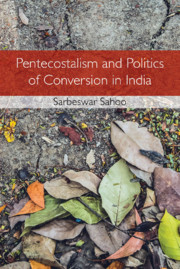Book contents
- Frontmatter
- Contents
- Foreword
- Preface
- Abbreviations
- 1 Introduction: Conversion and the Shifting Discourse of Violence
- 2 Spreading Like Fire: The Growth of Pentecostalism among Tribals
- 3 Taking Refuge in Christ: Four Narratives on Religious Conversion
- 4 Becoming Believers: Adivasi Women and the Pentecostal Church
- 5 Seen as the Alien: Hindutva Politics and Anti-Christian Violence
- 6 Conclusion: Beyond the Competing Projects of Conversion
- Endnotes
- Bibliography
- Index
Foreword
Published online by Cambridge University Press: 05 April 2018
- Frontmatter
- Contents
- Foreword
- Preface
- Abbreviations
- 1 Introduction: Conversion and the Shifting Discourse of Violence
- 2 Spreading Like Fire: The Growth of Pentecostalism among Tribals
- 3 Taking Refuge in Christ: Four Narratives on Religious Conversion
- 4 Becoming Believers: Adivasi Women and the Pentecostal Church
- 5 Seen as the Alien: Hindutva Politics and Anti-Christian Violence
- 6 Conclusion: Beyond the Competing Projects of Conversion
- Endnotes
- Bibliography
- Index
Summary
The global rise of Pentecostal Christianity is one of the most remarkable phenomena of rapid social and cultural change in the past few decades. For a considerable time, it remained almost unnoticed in the field of social sciences. It had certainly not been predicted by any current theory. In that sense it came as a surprise, shattering the basic assumptions of these disciplines and a widespread self-understanding. The great British sociologist of religion, David Martin, has compared this growth of a religious movement with epochal events like the fall of communism in Europe and the cultural transformations in the West during the 1960s – all developments of great consequence, but unforeseen by observers at the time.
Martin is himself one of the pioneers of research on Pentecostalism. His study of 1990 on ‘the explosion of Protestantism in Latin America’, published under the appropriately ‘Pentecostal’ title Tongues of Fire, represents the first authoritative study in this area. It is not a coincidence that it was written by the same scholar who had developed the most penetrating early critique of the secularisation thesis according to which modernisation in the sense of economic growth and scientific technological progress more or less automatically and irreversibly leads to religious decline. For him and those agreeing with his critical work and his attempts to develop a general theory of secularisation, the new phenomena became one of the cornerstones of an alternative approach to the understanding of religious change.
While this book by Martin was restricted to one geographical area, namely, Latin America, it was followed in 2002 by another study (Pentecostalism: The World Their Parish) that widened the focus and included Africa and Asia. Despite this broader horizon, India, one of the largest states of the world, remained rather marginal. Less than one page was devoted to the subcontinent. There were certainly some good reasons for this relative lack of attention at that point in time.
The present book is not the first, but is a particularly helpful empirical contribution to fill that obvious gap. The intellectual background of its author is not in the sociology of religion, but in political sociology.
- Type
- Chapter
- Information
- Pentecostalism and Politics of Conversion in India , pp. vii - xPublisher: Cambridge University PressPrint publication year: 2018



